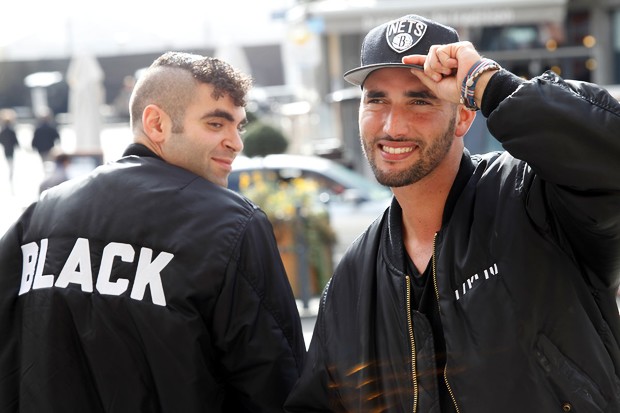Adil El Arbi and Bilall Fallah • Directors
"Making accessible films to fill a difficult brief"
- Cineuropa met with Adil El Arbi and Bilall Fallah to talk about Black, their second film.

Black [+see also:
film review
trailer
interview: Adil El Arbi and Bilall Fal…
interview: Martha Canga Antonio
film profile], by young Flemish directors Adil El Arbi and Bilall Fallah, is an effective and captivating film, a sort of modern West Side Story, which plunges us straight into the brutal everyday reality of inner city gangs, making the unknown streets of Brussels into a powerful cinematic object.
Cineuropa: What’s your background?
Adil El Arbi: We went to St-Lukas in Brussels. We were the only two Moroccans in the school and we hit it off straight away. Our teacher was Michael Roskam, the director of Bullhead [+see also:
film review
trailer
interview: Bart Van Langendonck
interview: Michaël R. Roskam
film profile]. He was a bit like a mentor to us, a big brother, just like Nabil Ben Yadir, the director of Barons [+see also:
film review
trailer
Interview with director and actress of…
interview: Nabil Ben Yadir
film profile]. The book Black, which is very popular in Flanders, is about inner city gangs and this Romeo and Juliet-esque story. We knew that one day we would turn it into a film. We emailed the writer, Dirk Bracke, but he wrote back saying that he already had a director and a production company lined up. So we decided to make a feature film with the VAF Wildcard (editor’s note: a short film grant) we were given. We were able to work on the screenplay for Black, and while pre-production on Image [+see also:
trailer
film profile] was underway, the director that had already been approached to make the film (Hans Herbot) came to us and said that we should make the film as we had a good grasp of the subject matter.
Where do you get your inspiration from?
Bilall Fallah: It was American films that made us want to make films. Films like Jurassic Park, Star Wars, big epic films, but also Spike Lee, Oliver Stone and Scorsese, directors who make films their own way whilst also making them highly accessible. We got a lot of inspiration for this film from City of God. We wanted to make a film by Adil and Bilall that reflects our personalities, but is aimed at a wider audience.
Adil: Black is a harsh story, a story of inner city gangs with very violent scenes, but we wanted to make a film that would appeal to as wide an audience as possible.
The casting is an essential element of the film, how did you go about this?
Bilall: We had to look for actors out on the streets, young Moroccans and Africans. You won’t find actors of those origins in other films or at the casting agencies here in Belgium.
Adil: We did a lot of rehearsals with the actors, we wanted to give them the freedom as artists to build various scenes themselves. Once we got them on set, we didn’t have much time for improvisation, so we did all that beforehand. We discovered we had some very talented individuals in the group, suddenly we had set up a sort of casting office. Our founder and sponsor was Matthias Schoenaerts and today, some of those actors have the chance to act in other productions. What was so great about these actors was that they connected with their characters, understood the everyday reality of their lives and the way they think.
The overall feel of the film is very gloomy, but it’s the energy running through the film that carries it
Adil: Once we got to the editing stage, we realised that the beating heart of the film was the couple, Marwan and Mavela. This film is a love story. For me, for want of getting by in the truest sense of the term, the two main characters grow spiritually. At first, they think that they have no choice but to be part of a gang. But as soon as they meet, they realise they have other options. It’s a story about two people who want to leave a gang, and therein lies hope.
Black turns Brussels into a truly cinematic entity
Adil: In Spike Lee and Scorsese’s films, New York is a main character. These films are spectacular because New York is spectacular, and that’s what we wanted to try and do with Brussels. We wanted to make the city into a character. Flemish films are often shot in Antwerp or in some burg in the middle of nowhere.
Bilall: We also wanted to convey the authenticity of quarters that only exist in Brussels, such as Matonge, Marolles, and certain parts of Molenbeek.
What are your plans?
Bilall: At the moment we’re at a crossroad: either we make another film in Brussels, we start working on a film about young people going to Syria, or we try our luck in the United States. We’ve just got back from a trip to Los Angeles, where we met with Columbia, Universal, Warner, Brian Grazer, Jerry Bruckheimer, and even a few actors. We pitched a few storylines to them, shared some of our ideas! We’ll have to wait and see what happens next, but in any case, we’re going to have to be very shrewd.
(Translated from French)
Did you enjoy reading this article? Please subscribe to our newsletter to receive more stories like this directly in your inbox.















